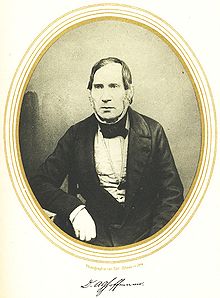Andreas Gottlieb Hoffmann
Andreas Gottlieb Hoffmann (born April 13, 1796 in Welbsleben , † March 16, 1864 in Jena ) was a German Protestant theologian and orientalist .
Life
Andreas Gottlieb Hoffmann was the son of a miller and had received his first basic education at the school in Egeln. In 1813 he moved to the Domgymnasium in Magdeburg, shortly thereafter as a student as a volunteer hunter in the wars of liberation of 1813 and moved with a Prussian regiment to Namur . The experience of patriotic enthusiasm shaped his liberal and national attitude to life. After the campaign he studied theology in Halle . There he joined the Corps Teutonia in 1817 . He lived with Wilhelm Gesenius and learned from him the Syriac language and the Hebrew language . As a preacher and student of Georg Christian Knapp , Hermann Agathon Niemeyer and Julius August Ludwig Wegscheider , he stood for Halle's rationalism and enjoyed a high reputation even as a student. Hoffmann received his doctorate on December 27, 1820 as Dr. phil.
After his habilitation in 1821 he read oriental languages as a private lecturer in Halle . In 1823 he turned down a call to the Albertus University of Königsberg and became an associate professor of theology at the University of Jena . He had refused to join the Philosophical Faculty. Since January 6, 1826, full honorary professor and assessor of the theological faculty there, he was appointed full fourth professor in July of the same year . In 1836 he moved to the third professorship, in September 1838 to the second and in 1844 to the first professorship. In connection with this he was given the title of church council in 1828, in 1843 he became the secret church council of Saxony-Altenburg and in 1845 received the command of the Saxon-Ernestine order of falcons . After leading an exegetical seminar for a number of years, he became director of the theological seminar in Jena in 1833 with Ludwig Friedrich Otto Baumgarten-Crusius .
From 1828 Hoffmann was the editor of the 2nd section of the General Encyclopedia of Sciences and Arts by Erf and Gruber , initially the 3rd to 7th volume together with Hassel , from the 8th volume to the 24th volume alone. He had brought in many of his own articles. Hoffmann spoke 23 languages and was considered to be “an excellent linguist; His main strengths were Hebrew and Syriac. ”As a member of the Senate, he held the Dean's Office of the Faculty of Theology 24 times between 1827 and 1863 and was Vice-Rector of the Alma Mater in the winter semesters of 1828, 1852, 1860 and the summer semesters of 1836 and 1844 . Lung sick since 1859, he died on March 16, 1864 in Jena. He left his first-rate private library to the Thuringian University and State Library .
Works (selection)
- Grammatica Syriaca. Halle 1827 Online , Halle 1867 ([Online]) (Hoffmann's main work, several editions and translations)
- Progr. Commentarii philologico-critici in Mosis benedictionem. Pars. I-IX. Halle and Jena from 1822
- Progr. Commentarii philologico-critici in Mosis benedictionem. Pars V. Jena 1833 (dean's program for the doctoral degree from Johann August Gottfried Hoffmann (born February 9, 1808 in Pößneck) online )
- Progr. Commentarii philologico-critici in Mosis benedictionem. Pars VI. Jena 1833 (Dean's program for the doctorate of Georg Karl Ludwig Theophil Fromann (born April 9, 1809 in Lautertal (Upper Franconia)) Online )
- Progr. Commentarii philologico-critici in Mosis benedictionem. Pars. VIII. Jena 1843 (Deanery program for the doctorate of Adolph Stieren (born June 14, 1813), online )
- The apocalyptic of the olden days among Jews and Christians in complete translation etc. 2 volumes (Vol. 1, Jena 1833 Online -1838), including the book Enoch
- Dubois' letters on the state of Christianity in India, in which the conversion of the Hindus is presented as impracticable. From the English, with notes and explanatory addenda, plus a foreword by DJF Röhr . Neustadt an der Orla 1824
- Design of the Hebrew Antiquities . Weimar 1832 (third revised edition by Heinrich Ehrenfried Warnekros (1752–1807), online )
- General popular biblical lexicon . Leipzig 1840 (1st volume online , 2nd volume online , continued by Gustav Moritz Redslob )
literature
- Gustav Moritz Redslob: Hoffmann, Andreas Gottlieb . In: Allgemeine Deutsche Biographie (ADB). Volume 12, Duncker & Humblot, Leipzig 1880, p. 571 f.
- Johannes Wischmeyer: HOFFMANN, Andreas Gottlieb. In: Biographisch-Bibliographisches Kirchenlexikon (BBKL). Volume 27, Bautz, Nordhausen 2007, ISBN 978-3-88309-393-2 , Sp. 676-682.
- G. Frank: Hoffmann, Andreas Gottlieb . In: Realencyklopadie for Protestant Theology and Church (RE). 3. Edition. Volume 8, Hinrichs, Leipzig 1900, pp. 215-216.
- Heinrich Döring : Jena University Almanac 1845. Jena 1845, p. 55, ( online )
- Conversations Lexicon of the Present. Friedrich Arnold Brockhaus, Leipzig, 1839, 14th vol., P. 911 ( online )
Web links
- Works by AG Hoffmann in Project Gutenberg ( currently not usually available for users from Germany )
- Literature by and about Andreas Gottlieb Hoffmann in the catalog of the German National Library
Individual evidence
- ^ Kösener corps lists 1910, 108 , 102
- ^ Volker Wahl: The photo album of the academic senate members from 1858 . Friedrich Schiller University, Jena 1983, p. 48.
| personal data | |
|---|---|
| SURNAME | Hoffmann, Andreas Gottlieb |
| BRIEF DESCRIPTION | German theologian and orientalist |
| DATE OF BIRTH | April 13, 1796 |
| PLACE OF BIRTH | World life |
| DATE OF DEATH | March 16, 1864 |
| Place of death | Jena |
